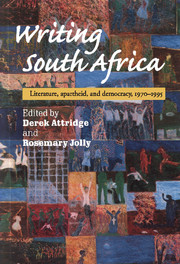Book contents
- Frontmatter
- Contents
- Contributors
- Acknowledgements and note on references
- South Africa, 1930–1996: a chronology
- Maps
- 1 Introduction
- 2 Interrogating silence: new possibilities faced by South African literature
- 3 I am dead: you cannot read: André Brink's On the Contrary
- 4 Endings and new beginning: South African fiction in transition
- 5 The post-apartheid sublime: rediscovering the extraordinary
- 6 Postmodernism and black writing in South Africa
- 7 Shame and identity: the case of the coloured in South Africa
- 8 A man's world: South African gay writing and the State of Emergency
- 9 The final safari: on nature, myth, and the literature of the Emergency
- 10 Interview
- 11 Speech and silence in the fictions of J.M.Coetzee
- 12 ‘Dialogue’ and ‘fulfilment’ in J.M. Coetzee's Age of Iron
- 13 Interview
- 14 Inside out: Jeremy Cronin's lyrical politics
- 15 Spinning out the present: narrative, gender, and the politics of South African theatre
- 16 South African theatre in the United States: the allure of the familiar and of the exotic
- Position papers
- Select bibliography: South African literary writing in English, 1970–1995
- Index
5 - The post-apartheid sublime: rediscovering the extraordinary
Published online by Cambridge University Press: 05 July 2011
- Frontmatter
- Contents
- Contributors
- Acknowledgements and note on references
- South Africa, 1930–1996: a chronology
- Maps
- 1 Introduction
- 2 Interrogating silence: new possibilities faced by South African literature
- 3 I am dead: you cannot read: André Brink's On the Contrary
- 4 Endings and new beginning: South African fiction in transition
- 5 The post-apartheid sublime: rediscovering the extraordinary
- 6 Postmodernism and black writing in South Africa
- 7 Shame and identity: the case of the coloured in South Africa
- 8 A man's world: South African gay writing and the State of Emergency
- 9 The final safari: on nature, myth, and the literature of the Emergency
- 10 Interview
- 11 Speech and silence in the fictions of J.M.Coetzee
- 12 ‘Dialogue’ and ‘fulfilment’ in J.M. Coetzee's Age of Iron
- 13 Interview
- 14 Inside out: Jeremy Cronin's lyrical politics
- 15 Spinning out the present: narrative, gender, and the politics of South African theatre
- 16 South African theatre in the United States: the allure of the familiar and of the exotic
- Position papers
- Select bibliography: South African literary writing in English, 1970–1995
- Index
Summary
My concern in this essay is to offer an account of the unfolding post apartheid condition within which contemporary South African writing takes place; the working premise of my investigation is that that writing (at its best) relates to its environing condition as the latter's most fully reflexive self-knowledge. In thus reading the condition through the optic of the writing (and vice versa), I wish to position myself beyond the space opened up by Njabulo Ndebele when, in the dying apartheid years, he called so eloquently for a post-heroic culture of irony, the local, the ordinary: that is to say, a culture, or a literature, preoccupied not with the polar conflicts of ‘the people’ versus ‘the state’ but with textures of life which have eluded that epic battle and have grown insouciantly in the cracks of the structures that South Africa's fraught modernity has historically thrown up. As my guide to occupying this space I have enlisted the work of J. M. Coetzee, and in particular his novel The Master of Petersburg (1994). Seemingly poles apart from that of Ndebele, Coetzee's work will nonetheless be seen to stand to Ndebele's in a relation of illuminating complementarity. More to the point: in his most egregious digression thus far from the ‘South African’ theme, Coetzee licenses me to wander as extravagantly in the territory of history and theory and indeed into the same national culture: that of Russia. Coetzee's use of the late Dostoevsky is, in short, my precedent for drawing on the early Bakhtin.
- Type
- Chapter
- Information
- Writing South AfricaLiterature, Apartheid, and Democracy, 1970–1995, pp. 57 - 74Publisher: Cambridge University PressPrint publication year: 1998
- 39
- Cited by

